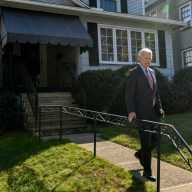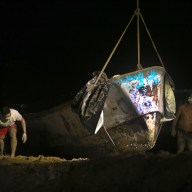OTTAWA – Gen. Rick Hillier, the country’s top military commander and most passionate spokesman for the war in Afghanistan, is stepping down in July after more than three years as chief of defence staff.
Hillier, 52, has been the most visible military leader in a generation and a political lightning rod over his often blunt assessments of Canada’s enemies and defence policy.
He has been both a blessing and a curse for the Conservative government, making a case for the combat mission in Kandahar when political leaders seemed unable to articulate it.
The job of top military commander generally lasts about three years and there were persistent rumours that Hillier – who celebrated that third anniversary on Feb. 5 – would soon be leaving.
Hillier said he was under no pressure from Prime Minister Stephen Harper to retire.
“He and I have had a discussion in the past – several times – about when it was appropriate and certainly he indicated that there was no hurry for me to go and he was very comfortable with me as chief of the defence staff.
“I felt that now, coming to the summer, was the appropriate time to hand off to somebody else.”
Hillier issued a statement on his departure, saying the military has “reached the critical milestones I originally set out for us to reach.”
“We have transformed how we recruit, train, equip, command, deploy, employ, bring home, recognize and care for our operational forces and our families, focused on achieving a strategic effect for Canada.
“We have been strengthened, immensely, by the vocal and visible support of millions of Canadians who have demonstrated that they recognize, understand and honour your service, and the sacrifice of your families.”
Harper praised Hillier in the House of Commons, saying he has worked well with the government.
“He is a great Canadian and we are very proud to have worked with him,” Harper said.
Hillier’s popularity has often overshadowed his political masters and became a liability last summer.
He wound up in a public tussle with former defence minister Gordon O’Connor over how long it would take for Canadian troops to train their Afghan counterparts – key to Canada’s exit strategy.
The contradiction between the two that was widely believed to have led to O’Connor’s shuffle out of the defence portfolio.
Harper and his Liberal predecessor, Paul Martin, have said they relied heavily on Hillier’s military advice.
It was Martin who appointed him to the top defence job and the former prime minister said Hillier was the man for the Canadian military at the right time.
“I think he’ll be remembered as the man who took office at the time when the rebuilding of the Canadian military was a priority for the government and he fulfilled every expectation,” Martin told The Canadian Press.
The timing of his departure was deliberate, Hillier said, coming after months of consideration and following Parliament’s extension of the mission in Kandahar by three years.
Seeing the mission through to 2011 was an additional time commitment he said he wasn’t prepared to make, having initially planned to stay in the chief’s job for only two years.
Ordinary soldiers, sailors and aircrew worshipped Hillier and his loss will be felt keenly, many of them said Tuesday.
“The care of the soldiers was his primary goal and we really, really feel it,” said Warrant Officer Daniel Demers, a recruiter.
“For us, everyone was ready to step forward with this man.”
The woman who is, technically speaking, Hillier’s boss, said he informed her of the decision a while ago.
Gov. Gen. Michaelle Jean has spent plenty of time with him. When she took on her post as commander-in-chief of the Canadian Forces, she said Hillier was extremely helpful in sharing his military knowledge, and to this day they console grieving families together at repatriation ceremonies whenever a Canadian soldier is killed in Afghanistan.
“He always had the right word and the right thing to say to the military – and also to their families,” Jean told reporters during a trip to the Arctic.
“He always paid tribute to their many sacrifices. . . I have the highest respect for him and I wish him the best.”
Hillier’s outspoken comments have fuelled speculation that he could be considering a political career – an assertion Hillier has consistently dismissed.
He was asked a potential political career and responded: “No. Is that clear?”
Some have credited him with being the architect of Canada’s military mission in Kandahar, the most intense conflict the country has been involved in since the Korean War.
A recent book, co-authored by a former Liberal insider, claimed Hillier’s persuasive arguments persuaded an uncertain Paul Martin to approve the deployment in 2005.
The man who recommended Hillier’s appointment to Martin said the general is a forceful personality.
“He brought a combination of drive, intelligence and experience … that made him in the end the logical choice,” said former Liberal defence minister Bill Graham.
His replacement is widely expected to come from the army even though the top defence job, by custom, usually rotates between services.
One of the names often mentioned is Lt.-Gen. Andrew Leslie, the current head of the army.
Also mentioned is Lt.-Gen. Walter Natynczyk, vice-chief of defence staff since 2006. He was on exchange with U.S. Army III Corps in Texas during the invasion of Iraq, went with the III Corps to Iraq and became deputy commanding general of the Multi-National Corps.
NDP Leader Jack Layton, who has often been critical of Hillier, was full of praise Tuesday.
“Here’s someone who has given many years of service to our country,” Layton said.
“We always have to be thankful that people are willing to do these kinds of difficult jobs and when they decide to move on and take their retirement, I think all Canadians would want to wish the general well and certainly I would add my name to that list of Canadians.”
Born in 1955, Hillier was known as the soldiers’ soldier, an outspoken advocate who put the welfare of his troops before all else.
His legacy will be a renewed military, equipped with new aircraft, vehicles and other equipment depleted by years of budget cuts and neglect.
Having earned a science degree from Memorial University in his native Newfoundland, Hillier joined the army 36 years ago and trained as an armoured officer.
He said when he joined he had no ambitions to be a general: “I just wanted to be a soldier.”
Hillier’s career took him from regimental duties in a tank unit to staff jobs in Montreal and National Defence Headquarters in Ottawa, where he eventually became army, then defence, chief.
He has served across Canada, twice in Europe and the United States, and did a term as the senior NATO officer in Afghanistan.
His predecessor, air force Gen. Ray Henault, served five years in the job, while Gen. John de Chastelain served two separate appointments – from 1989 until 1993, and again in 1994-95.












